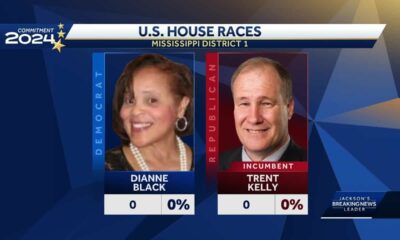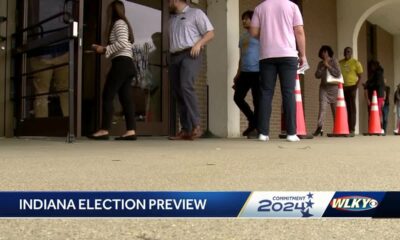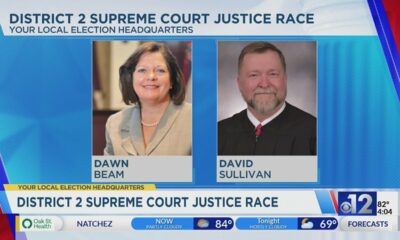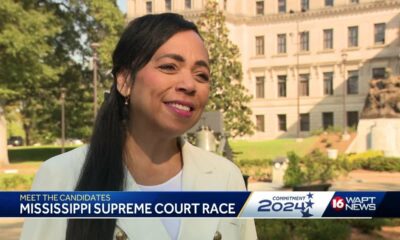Mississippi News
In Mississippi, Christian forgiveness does not equate to felony voting reforms
In Mississippi, Christian forgiveness does not equate to felony voting reforms
As Haley Barbour faced an onslaught of criticism for pardoning dozens of people convicted of felonies as his tenure as governor ended in 2012, he cited his Christian beliefs for his actions.
“Christianity teaches us forgiveness and second chances. I believe in second chances, and I try hard to be forgiving,” the former governor said soon after leaving office of the more than 200 acts of clemency he granted.
During his eight years as governor, Barbour, like most other Mississippi politicians, did nothing to make that forgiveness more inclusive by creating a system that would make it easier for the literally tens of thousands of people convicted of felonies to have their voting rights restored.
Most Mississippi politicians wear their Christianity on their sleeve. The primary tenet of the Christian faith is forgiveness and redemption. Yet, they do not see as part of that forgiveness and redemption the restoration of voting rights for people convicted of felonies.
Multiple studies have made the argument that restoring voting rights increases the odds that people who have been convicted of felonies will become productive members of society.
Dennis Hopkins, a 46-year-old Potts Camp resident who lost his right to vote as a teenager when he was convicted of grand larceny, but is now a productive member of the community in the north Mississippi hamlet, explained to lawmakers the importance of voting.
“Voting to me is everything,” Hopkins said in 2021 during a legislative hearing. “I tell my kids how important the vote is … it shames me to tell them I can’t vote.”
The old adage that the judicial system moves slowly has never been truer than when it comes to Mississippi’s one-in-the-nation system of preventing people convicted of certain felonies from regaining their voting rights.
On Sept. 25, 2021 (more than 10 months ago), the entire panel of the 5th Circuit Court of Appeals heard arguments about whether Mississippi’s felony disenfranchisement is unconstitutional. Seventeen judges heard the argument at the federal courthouse in New Orleans. It is not an everyday occurrence for the entire panel to hear oral arguments, so the assumption was that the federal appeals court was placing a priority on the issue.
But since that September day, there have been crickets from the court.
At some point, the court finally will issue a ruling.
In Mississippi, people with felony convictions must petition the Legislature to get a bill passed by a two-thirds majority of both chambers to regain voting rights. Normally only a handful (less than five) of such bills are successful each session. There is also the option of the governor granting a pardon to restore voting rights. But no governor has granted pardons since Barbour in 2012.
For a subset of those who lose their rights, the courts can expunge their record. In some instances that expungement includes the restoration of voting rights and for others it does not. It just depends on the preference of the judge granting the expungement.
During the 2022 session, legislation was passed clarifying that the judicial expungement would always include the restoration of voting rights. That modest legislation would have been the biggest change to the state’s felony voting system since it was incorporated into the Mississippi Constitution in 1890. But it was vetoed by Gov. Tate Reeves.
The U.S. Supreme Court in past decisions has given the states broad leeway in stripping the right to vote for those convicted of felonies. But it is worth pointing out that Mississippi is in a distinct minority of states (less than 10) not automatically restoring voting rights at some point after a sentence is completed.
The aforementioned 5th Circuit is considering the argument that the Mississippi felony voting ban is unconstitutional because it was placed in the 1890 state Constitution as one of many provisions intended to prevent African Americans from voting. If it was done for racial reasons, then it should be unconstitutional, the proponents of the lawsuit argue. Mississippi Attorney General Lynn Fitch opposes the lawsuit.
In the 1890s, the Mississippi Supreme Court wrote the disfranchisement of people of specific felonies was placed in the Constitution “to obstruct the exercise of the franchise by the negro race” by targeting “the offenses to which its weaker members were prone.” The crimes selected by lawmakers to go into the provision were thought by the white political leaders at the time as more likely to be committed by African Americans. They also imposed poll taxes, literacy tests, segregated schools, a ban of mixed race marriages and other racist provisions into the Constitution.
They, of course, took all of those steps in the name of Christianity.
This article first appeared on Mississippi Today and is republished here under a Creative Commons license.
Mississippi News
Events happening this weekend in Mississippi: April 25-27
SUMMARY: This weekend in Mississippi (April 25-27) features a variety of events across Central and Pine Belt regions. Highlights include MiraGotSoul at Vibe Studio in Jackson, a community Dinner and Movie in Clinton, and the Natchez Kite Festival. Enjoy live performances with Sweet Lizzy Project in Natchez and the New Bourbon Street Jazz Band in Clinton. Family-friendly activities include the Native Plant Fest and Community Farmers Market in Jackson. In Hattiesburg, catch the Henry Cho tour and the Downtown Crawfish Jam Music Festival. Overall, it’s a weekend full of entertainment, culture, and fun activities for all ages.
The post Events happening this weekend in Mississippi: April 25-27 appeared first on www.wjtv.com
Mississippi News
Events happening this weekend in Mississippi: April 18-20
SUMMARY: This weekend (April 18-20), Mississippi offers a variety of events for all ages. In Jackson, enjoy Food Truck Friday, a jazz concert, free outdoor movie screenings, and multiple exhibitions including “Of Salt and Spirit” and “Hurricane Katrina: Mississippi Remembers.” For family fun, there’s an Easter Egg Hunt at the Ag Museum and “Bunnies & Butterflies” at MCM. Natchez features the Spring Pilgrimage, Lafayette’s 200th anniversary celebration, and a farmers market. In the Pine Belt, highlights include Live at Five, a Spring Candle-Making Workshop, and Easter events at the Hattiesburg Zoo. Don’t miss the Bluff City Block Party and more!
The post Events happening this weekend in Mississippi: April 18-20 appeared first on www.wjtv.com
Mississippi News
Events happening this weekend in Mississippi: April 11-13
SUMMARY: This weekend in Mississippi (April 11-13), enjoy a variety of events across the state. Highlights include the Eudora Welty Birthday Bash in Jackson, Trivia Night at the Mississippi Museum of Natural Science, and Boots & Bling Fundraiser in Natchez. For family fun, check out the Bunny Bonanza in Jackson or the Easter Egg Hunt in Clinton. The Natchez Concours d’Elegance Car Show and Stranger Than Fiction Film Festival offer cultural experiences, while the 12th Annual Dragon Boat Regatta in Ridgeland and the Hub City Classic Car Show in Hattiesburg provide exciting activities for all ages.
The post Events happening this weekend in Mississippi: April 11-13 appeared first on www.wjtv.com
-

 News from the South - Florida News Feed7 days ago
News from the South - Florida News Feed7 days agoJim talks with Rep. Robert Andrade about his investigation into the Hope Florida Foundation
-

 News from the South - Alabama News Feed5 days ago
News from the South - Alabama News Feed5 days agoPrayer Vigil Held for Ronald Dumas Jr., Family Continues to Pray for His Return | April 21, 2025 | N
-

 Mississippi Today6 days ago
Mississippi Today6 days ago‘Trainwreck on the horizon’: The costly pains of Mississippi’s small water and sewer systems
-

 News from the South - Florida News Feed5 days ago
News from the South - Florida News Feed5 days agoTrump touts manufacturing while undercutting state efforts to help factories
-

 News from the South - Texas News Feed6 days ago
News from the South - Texas News Feed6 days agoMeteorologist Chita Craft is tracking a Severe Thunderstorm Warning that's in effect now
-

 News from the South - Arkansas News Feed7 days ago
News from the South - Arkansas News Feed7 days agoAs country grows more polarized, America needs unity, the ‘Oklahoma Standard,’ Bill Clinton says
-

 News from the South - Missouri News Feed22 hours ago
News from the South - Missouri News Feed22 hours agoMissouri lawmakers on the cusp of legalizing housing discrimination
-

 News from the South - Florida News Feed5 days ago
News from the South - Florida News Feed5 days agoFederal report due on Lumbee Tribe of North Carolina’s path to recognition as a tribal nation

















































